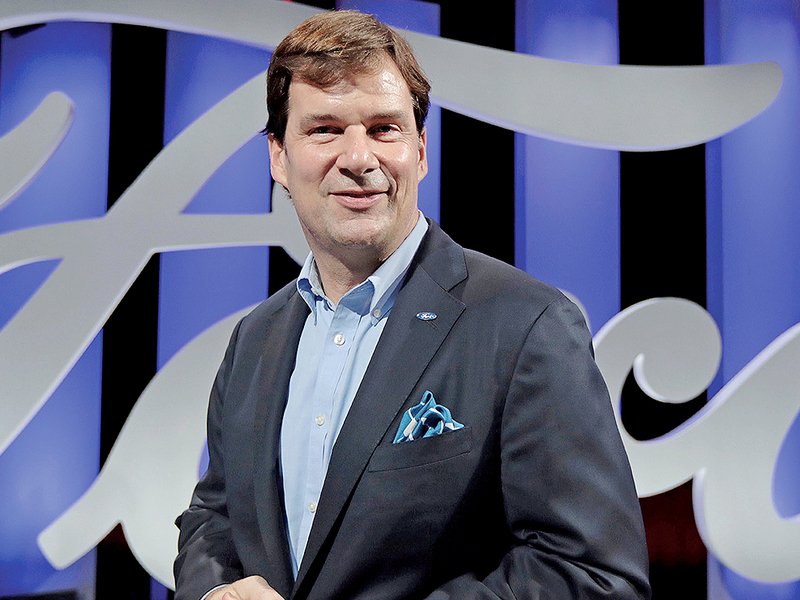
DETROIT — Ford Motor Co. COO Jim Farley said Thursday it’s too soon to tell when North America production will reach pre-coronavirus levels after the automaker resumes work in plants next week, but the time frame will largely be determined by the supply chain.
“One of the most important enablers for us to get to full production as soon as possible, obviously, will be the safety of our team members but also the supply base,” Farley said in response to a question at its annual shareholders meeting. “All of our production manufacturing operations rely on healthy suppliers and their ability to start up is really critical.”
A number of suppliers came back online this week in preparation for a May 18 restart date at most Detroit 3 plants in the U.S.
Kumar Galhotra, Ford’s president of the Americas and international markets group, told Automotive News on Wednesday he was confident it would have enough parts to resume limited production next week.
“We’ve done very thorough planning to make sure the entire system ramps up the next few days for us to get going on the 18th,” Galhotra said. “There’s a very smart team of people working very diligently, long hours, to make sure we get that done.”
Farley on Thursday said Ford shared its return-to-work playbook with suppliers, many of whom have developed their own similar safety practices.
Even after Ford posted dismal first-quarter earnings results and promised more financial pain ahead, Executive Chairman Bill Ford on Thursday said the company was confident in its plan to weather the coronavirus crisis and emerge stronger. He reiterated promises to continue to invest in its product portfolio.
He promised to restore the quarterly dividend, suspended earlier this year to conserve cash, “as soon as practical” once the crisis subsides.
“The pandemic is affecting our business, and we know the days ahead will be challenging, but we also know that we’ve overcome difficult times in the past,” he said.
Addressing Ford’s struggling stock price, Ford said he feels “very good” about the company’s plan.
“We’ve got the right metrics in place,” he said. “Look, management’s compensation is heavily tied to our stock, so it’s in everyone’s interest to get our stock price back up.”
Since Ford became chairman in 1999, the automaker’s shares are down 91 percent, while the S&P 500 index is up 129 percent, according to Bloomberg.
The meeting, held virtually since 2017, again included a proposal to remove the Ford family’s special class of shares. It again failed, although the measure received 35.1 percent of voters’ support, up slightly from the 34.3 percent of support it received in 2019.
Farley also said most of Ford’s dealers received payroll protection loans from the U.S. government amid the coronavirus pandemic.
Early in the outbreak, Ford “made sure” its U.S. dealers applied with the U.S. Small Business Administration for federal loans to protect their payrolls and employees, Farley told shareholders.
“This really paid off because about 90-plus percent of our dealers applied and now more than 80 percent have been funded,” he said.
Ford worked closely with its network of just over 3,000 U.S. franchised dealers to ensure they were aware of the loan process and tracked their progress, spokesman Said Deep said after the meeting.
“They are independent businesses, and they all have their own relationships with their banks, so that was the extent of our involvement,” Deep said in an email.
Auto dealers were hard hit by the outbreak, with some states temporarily barring new-vehicle sales. Sales have plummeted amid stay-at-home orders aimed at curbing the spread of the highly contagious novel coronavirus.
The U.S. government’s “Payroll Protection Program” to aid small businesses, part of an economic relief package passed by Congress, opened chaotically in April and ran out of funds in less than two weeks. The SBA then processed a second batch of applications.
The loans are forgivable if companies use at least 75 percent on payroll expenses.
The program has been criticized for not getting loans to the smaller firms that need them and have few other capital sources.
Among the companies that have returned the loans are dealer groups AutoNation Inc. and Penske Automotive Group Inc.
Farley said the automaker watches its dealers’ profitability closely, and that in March and April those dealers were in “great shape” and their financial health was improving daily as state economies reopened.
Reuters contributed to this report.